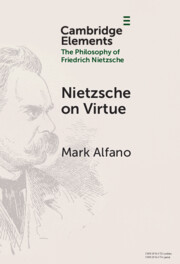Friedrich Nietzsche is one of the most important and influential philosophers of the nineteenth century. In recent decades, there has been a resurgence of interest in his thought due to the potential it has to contribute to contemporary conversations in Anglophone philosophy on knowledge, ethics, and moral psychology. Yet this resurgence of interest is also due to a distinctive feature of Nietzsche’s thought: his deep and serious engagement with some of the perennial questions of human existence. How might we live meaningfully? What are the limits of human freedom? Is knowledge possible? What is the structure of reality? The Elements in this series offer balanced, comprehensive coverage of the leading areas of Nietzsche research. Collectively, the series provides a comprehensive guide to Nietzsche’s philosophy and its continuing impact.

Kaitlyn Creasy is Associate Professor of Philosophy at California State University, San Bernardino. She is the author of The Problem of Affective Nihilism in Nietzsche (2020) as well as several articles in nineteenth-century philosophy and moral psychology.
Matthew Meyer is Professor of Philosophy at The University of Scranton. He is the author of three monographs: Reading Nietzsche through the Ancients: An Analysis of Becoming, Perspectivism, and The Principle of Non-Contradiction (2014), Nietzsche’s Free Spirit Works: A Dialectical Reading (Cambridge, 2019), and The Routledge Guidebook to Thus Spoke Zarathustra (2024). He has also co-edited, with Paul Loeb, Nietzsche’s Metaphilosophy: The Nature, Method, and Aims of Philosophy (Cambridge, 2019).